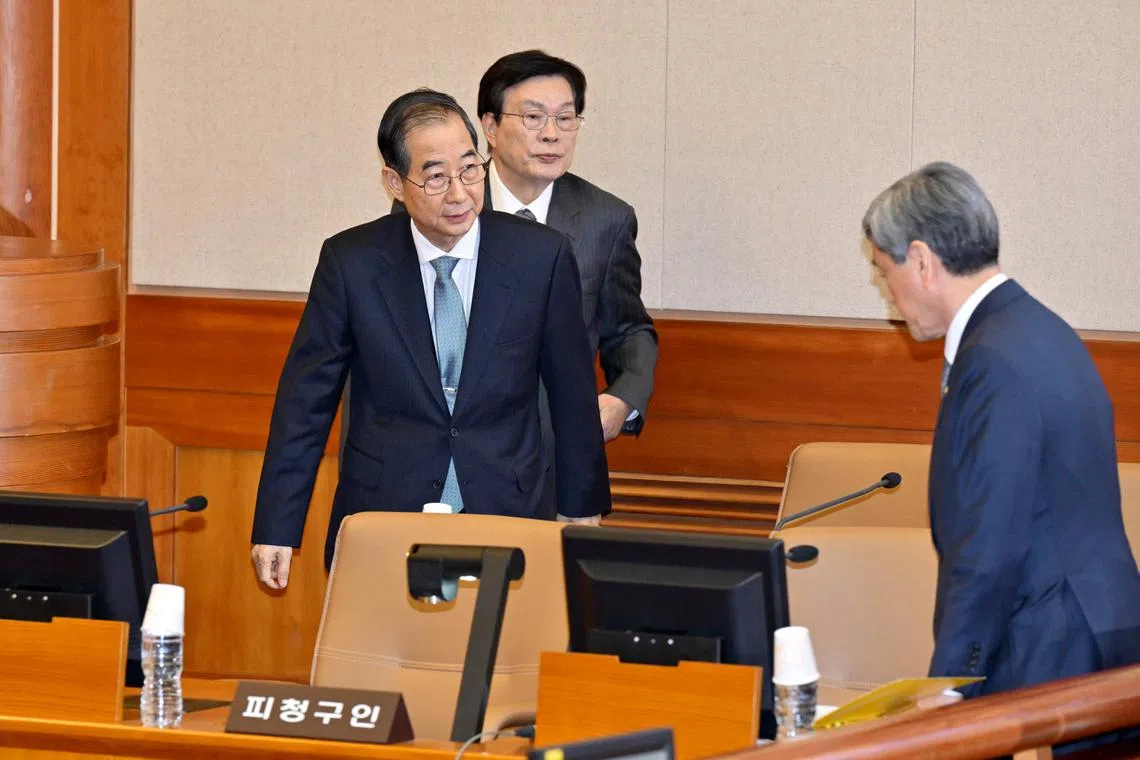South Korea’s ousted PM says he tried to stop martial law decree
Sign up now: Get insights on Asia's fast-moving developments

South Korea's ousted premier Han Duck-soo attending the first hearing of his impeachment trial in Seoul on Feb 19.
PHOTO: EPA-EFE
Follow topic:
SEOUL - South Korea’s ousted premier said on Feb 20 that he had opposed suspended President Yoon Suk Yeol’s declaration of martial law, testifying for the first time at his former boss’s impeachment trial
Mr Han Duck-soo was impeached by Parliament
On Feb 20, he appeared before that trial for the first time, telling Seoul’s Constitutional Court he had “expressed my opposition” to Mr Yoon’s decision to suspend civilian rule
Mr Han said he and most of his fellow Cabinet members “believed such a declaration would put South Korea in serious difficulty”, and that he recalled them “being concerned and trying to dissuade it”.
The Feb 20 hearing was Mr Yoon’s 10th before Seoul’s Constitutional Court.
Once the hearings wrap up, the judges will go behind closed doors to deliberate Mr Yoon’s fate – with elections required in 60 days if he is removed.
Mr Yoon walked out of the court just five minutes after proceedings began on Feb 20, according to a pool report.
His lawyer Yoon Kap-keun told reporters that the ousted president felt it was “inappropriate” for him to sit in the same court room with Mr Han “or for the president to watch the prime minister testify”.
“It is not good for the nation’s prestige,” his lawyer quoted Mr Yoon as saying.
Mr Yoon later returned to hear the testimony of former senior intelligence official Hong Jang-won, seen as a key figure in the decision to declare martial law.
Mr Hong has claimed to be in possession of a memo containing a list of names of individuals Mr Yoon ordered arrested during the night of the martial law declaration, including the leaders of the opposition and Mr Yoon’s own ruling party.
“I will do my best to recount everything as I remember it,” Mr Hong told reporters before the hearing.
The head of South Korea’s National Police Agency, who is also on trial on insurrection charges related to the martial law decree, is another witness.
Courting controversy
The impeachment hearing was Mr Yoon’s second of the day – he had appeared in court in the morning
The 64-year-old former prosecutor has been behind bars since he was arrested in January on those charges,
Mr Yoon attended that hearing but did not speak, an AFP journalist in the packed courtroom said.
Prosecutors have accused the suspended president of being the “ringleader of an insurrection”.
They argued on Feb 20 against releasing him from detention, saying he could try to “influence or persuade those involved in the case”.
Addressing the court, Mr Yoon’s lawyer Kim Hong-il in turn condemned the “illegal probe”, arguing the “investigating body has no jurisdiction”.
“The declaration of martial law was not intended to paralyse the state,” Mr Kim said.
Instead, he said, it was meant to “alert the public to the national crisis caused by the legislative dictatorship of the dominant opposition party, which had crippled the administration”.
Much of Mr Yoon’s impeachment trial has centred on the question of whether he violated the constitution by declaring martial law, which is reserved for national emergencies or times of war.
But it has plunged the democracy into months of political turmoil with protests, two impeachments and a surge of online disinformation.

